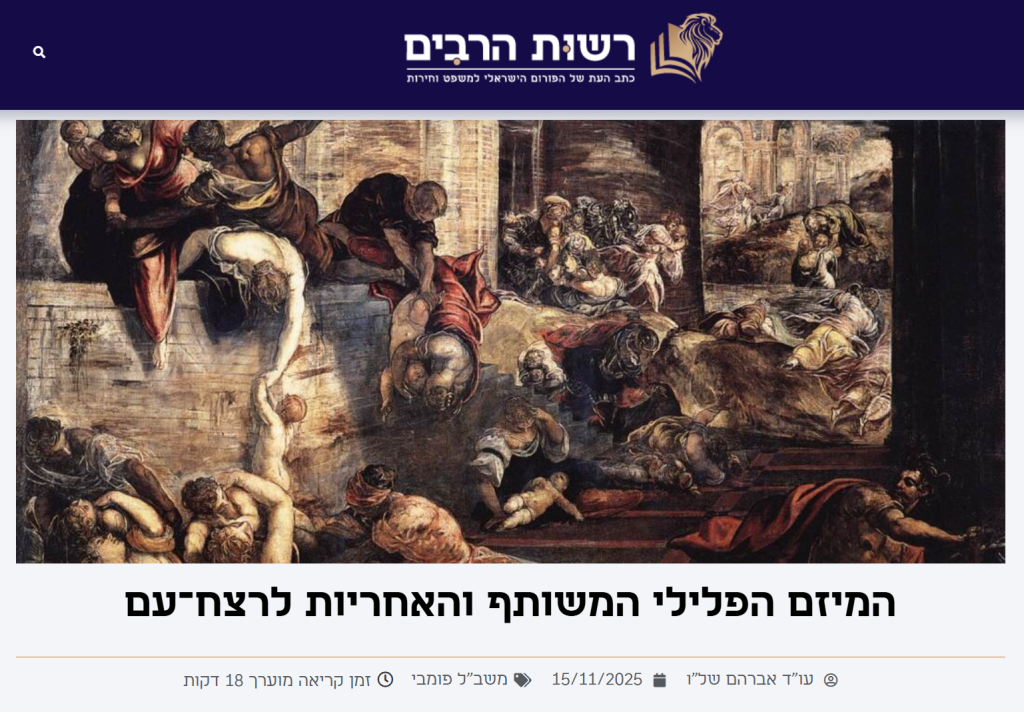Rami Hod wrote an op-ed for [Walla!] about the Haredi (ultra-orthodox) education budgeting in which he castigated Kohelet Policy Forum – and misrepresented the facts. Here at Kohelet Forum we supported equalizing Haredi school budgets with state ones’ contingent on conditions, including the addition of core studies to their curriculum, the absence of discrimination in their student acceptance practices and transparency.
Only after I was discharged from reserve duty last week did I discover that Berl Katznelson Foundation’s Rami Hod has been conducting a vicious smear campaign against Kohelet Policy Forum – including lies and factual mistakes about education policies in Israel. I had naively thought that aside from some extremist elements still mentally trapped in an October 6 mindset, a wide consensus had been reached about the need to settle our disagreements with mutual respect and honesty, minus all hatred, manipulations and lies.
Leading a smear campaign in a time of war against a rival organization, many of whose members are enlisted in the war effort, the way Hod is doing now, is despicable. However, instead of getting into a fight, I will simply correct some of his mistakes. Beyond that, Hod and his friends are welcome to stop attacking imagined positions and speak with us directly, or at least read our policy papers. This should be the standard to be expected from researchers, as differentiated from politicians, campaign leaders, or cyber bullies.
The issue that brought on Hod’s attacks is the increased budget to the Haredi parties’ education systems. When the issue was raised during coalition negotiations prior to the government’s formation, we repeatedly expressed the opinion that the Haredi sector schools’ budget should be equalized to the state schools’ budget contingent on a few conditions:
First, including the instruction of “core studies”, supervised by comparative testing and measurements as opposed to reporting on hours of study. Second, the absence of discrimination practices in student acceptance, especially on the elementary school level. Furthermore, meeting appropriate physical and safety criteria as well as increasing transparency in their use of funds.
If Rami Hod had bothered to check before smearing us, he would have discovered that we oppose budget increases under current conditions. The data actually show that Haredi girls studying in private seminaries achieve higher grades on average than the students in the state system because their curriculum includes core studies, even though their private institutions are not subject to regulation and supervision by the Ministry of Education. There is no reason Haredi boys should not fall in line.
Hod’s article makes other factual mistakes: the church schools he mentioned, who are now justifiably demanding a budgetary increase as well, do not “charge [parents] tuition ranging from five to fifteen thousand shekels a year”, the vast majority of them charge less than five thousand, despite the fact that their public budget is tens of percent lower than that of public schools. Should their budget be equalized, as we anticipate it will, it will certainly not make Israel “the first Western state to grant private schools one hundred percent public funding” as Hod claims.
Many states grant equal budgets, on a per student basis, whether they are registered to a private school (that meets criteria set by the state) or to a public one – among them England, the Netherlands, Denmark, Finland, Norway, and others. Apparently, social-democracies don’t forcibly nationalize all educational institutions in the state or declare a war of annihilation against private education. In point of fact, it is full public funding and oversight against discrimination that allow lower income communities to access (supervised) private schools, while a restriction of the budget forces schools to rely on high tuition paid by parents, thus excluding lower income communities and leading to segregation.
Aside from a few rare cases, there is no real private education in Israel outside the Haredi sector. Even institutions that are not owned by the state are subject to endless regulation that restricts their freedom to initiate and innovate. License for a “recognized but unofficial” school is, for instance, dependent on the school implementing the Ministry of Education’s curriculum – which is far wider than core studies, on hiring teachers in accordance with the Ministry of Education’s collective agreements, while the vacation schedule must be identical to that of the public system, and so too class distribution, the length of school hours and number of schooldays – all must be identical to public schools. It is something of a sad joke to call them “private”, when the primary difference between them and the public schools is underfunding and very little extra leeway.
The Israeli Ministry of Education is extremely centralized in comparison to other Western countries, and the cost of such strangulation is high. The Ministry’s primary role should be setting the goals that need to be met by the schools, conducting a thin and efficient supervision of the schools meeting those goals and presenting their data to the public, and distributing equal, flexible funding to institutions for each student they enroll, regardless of religion, race, sector or sex.
Kohelet Policy Forum has put forward proposals on how to transfer the system to such a model, in line with what has been done in other states that boast higher and more equal achievement without their Ministries strangling and micromanaging every detail and resource granted to the education system from top down. We believe in the possibility of improving education in this country, but such will not occur by spreading hatred toward other sectors but by debate and honest discussion based on the facts.
First published in Hebrew in walla!




